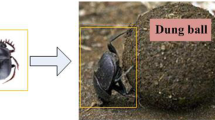Abstract
There are various problems in the engineering field which can be modeled as an optimization problem and can be solved through metaheuristic optimization algorithms. In this paper, a new metaheuristics algorithm named as Fission Fusion Behavior-based Rao Algorithm (FFBBRA) has been proposed. This new algorithm utilizes the concepts of metaphor-less Rao algorithm and the idea of fission–fusion social behavior of Spider Monkey Optimization (SMO). The proposed methodology divides the entire population into subpopulations and then these subpopulations are independently updated concerning their local worst and global best candidates using the FFBBRA equations. The proposed method has been tested over 20 unconstrained functions including multimodal, unimodal, and fixed dimensions benchmark functions along with 2 constrained benchmark functions. The performance of the proposed algorithm is evaluated through observations of the worst solution, the best solution, standard deviation, and mean solution. Convergence analysis is also performed. The proposed FFBBRA has shown good performance as observed by Friedman Test. This proposed algorithm is also easily utilized on parallel systems due to its parallel working nature.

















Similar content being viewed by others
References
Amrita C, Arpan KK (2017) Swarm intelligence: a review of algorithms: Nature-inspired computing and optimization. Model Optim Sci Technol, 10
Yang XS (2020) Nature-inspired optimization algorithms: challenges and open problems. Elsevier J Comput Sci 46:101104
Mohammadi FG, Amini MH, Arabnia HR (2020) Evolutionary computation, optimization and learning algorithms for data science. Optim, Learn Control for Interdependent Complex Netw 1123:37–65
Abualigah, L.; Diabat, A.; Mirjalili, S.; Abd Elaziz, M.; Gandomi, A.H. The Arithmetic Optimization Algorithm. Comput. Methods Appl. Mech. Eng. (2021)
Abualigah L, Yousri D, Abd Elaziz M, Ewees A, Al-qaness MA, Gandomi AH (2021) Aquila optimizer: a novel meta-heuristic optimization algorithm. Comput Ind Eng 157:107250
Abualigah L, Diabat A, Sumari P, Gandomi A (2021) Applications, deployments, and integration of internet of drones (IoD): a review. IEEE Sens J 21:25532–25546
Rao RV (2020) Rao algorithms: three metaphor-less simple algorithms for solving optimization problems. Int J Ind Eng Comput 11:107–130
Rao RV (2016) Jaya: a simple and new optimization algorithm for solving constrained and unconstrained optimization problems. Int J Ind Eng Comput 7:19–34
Aslan M, Gunduz M, Kiran MS (2019) JayaX: Jaya algorithm with Xor operator for binary optimization. Appl Soft Comput 82:105576
Rao RV, Pawar RB (2020) Constrained design optimization of selected mechanical system components using Rao algorithms. Appl Soft Comput 89:106141
Rao RV, Pawar RB (2020) Optimal weight design of a spur gear train using Rao algorithms. Springer, ICSISCET 2019. PALO 13:351–362
Rao RV, Keesari HS (2020) Rao algorithm for multi-objective optimization of selected thermodynamics cycles. Springer: Eng Comput, pp. 1–29
Hassan MH, Kamel S, El-Dabah MA, Khurshaid T, Dominguez-Garcia JL (2021) Optimal reactive power dispatch with time-varying demand and renewable energy uncertainty using Rao-3 algorithm. IEEE Access 9:23264–23283
Rao RV, Pawar RB (2020) Self-adaptive multi-population Rao algorithms for engineering design optimization. Appl Artif Intell 34(3):187–250
Vasundhara-Devi R, Siva-Sathya S (2017) Monkey behavior based algorithms: a survey. Int J Intell Syst Appl (IJISA) 9(12):67–86
Agrawal V, Rastogi R, Tiwari DC (2018) Spider monkey optimization: a survey. Int J Syst Assurance Eng Manag 9(4):929–941
Sharma H, Hazrati G, Bansal JC (2019) Spider monkey optimization algorithm. Springer, Cham, Evolutionary and swarm intelligence algorithms, pp. 43-59
Akhand MAH, Safial IA, Shahriyar SA, Siddique N, Hojjat A (2020) Discrete spider monkey optimization for traveling salesman problem. Appl Soft Comput 86:105887
Kumar S, Sharma B, Sharma VK, Sharma H, Bansal JC (2020) Plant leaf disease identification using exponential spider monkey optimization. Sustain Comput: Inform Syst 28:100283
Liangjun K, Roberto B (2013) MOEA/D-ACO: A multiobjective evolutionary algorithm using decomposition and ant colony. IEEE Trans Cybernet 43(6):1845–1859
Basseur M, Burke E (2007) Indicator-based multi-objective local search. IEEE Congress on Evolutionary Computation
Imen B, Ines A, Moncef T (2019) A gradual weight-based ant colony approach for solving the multiobjective multidimensional knapsack problem. Evol Intell 12(2):253–272
Imen B, Ines A (2015) Indicator-based ant colony optimization for multi-objective knapsack problem. Procedia Comput Sci 60:448–457
Imen B, Basseur M, Frederic S (2015) A multi-population algorithm for multi-objective knapsack problem. Appl Soft Comput 70:814–825
Imen B, Ines A, Moncef T (2021) Indicator weighted based multi-objective approach using self adaptiveneighborhood operator. Procedia Comput Sci 192:338–347
Yang XS, He X-S, Qin-Wei F (2020) Mathematical framework for algorithm analysis. Elsevier, Nature-Inspired Comput Swarm Intell 7:89–108
Momin J, Yang XS (2013) A literature survey of benchmark functions for global optimization problems. Int J Math Model Num Optim 4:150–194
Beiranvand V, Hare W, Lucet Y (2017) Best practices for comparing optimization algorithms. Optim Eng 18:815–848
Cheng R, Li MYT, Zhang X, Yang S, Jin Y, Yao X (2017) Benchmark functions for the CEC’2017 competition on many-objective optimization. Tech Report No. CSR-17–01.
Bartz B, Thomas CD, Daan van den B, Jakob B, Chandrasekaran S, Tome E, Andreas F (2020) Benchmarking in optimization: best practice and open issues. arXiv preprint arXiv:2007.03488
Kohli M, Arora S (2018) Chaotic grey wolf optimization algorithm for constrained optimization problems. Journal of Computational Design and Engineering, pp. 458–472
Derrac J, García S, Molina D, Herrera F (2011) A practical tutorial on the use of nonparametric statistical tests as a methodology for comparing evolutionary and swarm intelligence algorithms, Swarm Evol. Comput. 1
Wachowiak MP, Timson MC, DuVal DJ (2017) Adaptive particle swarm optimization with heterogeneous multicore parallelism and GPU acceleration. IEEE Trans Parallel Distrib Syst 28(10):2784–2793
Mane SU, Pawar A, Omane R (2015) GPGPU based teaching-learning based optimization and artificial bee colony algorithm for unconstrained optimization problems. IEEE Int Adv Comput Conf (IACC), pp. 1056–1061
Lalwani S, Sharma H, Satapathy SC, Deep K, Bansal JC (2019) A survey on parallel particle swarm optimization algorithms. Arab J Sci Eng 44:2899–2923
Author information
Authors and Affiliations
Corresponding author
Additional information
Publisher's Note
Springer Nature remains neutral with regard to jurisdictional claims in published maps and institutional affiliations.
Rights and permissions
About this article
Cite this article
Pawar, S., Ahirwal, M.K. A new fission fusion behavior-based Rao algorithm (FFBBRA) for solving optimization problems. Evol. Intel. 16, 1309–1323 (2023). https://doi.org/10.1007/s12065-022-00741-y
Received:
Revised:
Accepted:
Published:
Issue Date:
DOI: https://doi.org/10.1007/s12065-022-00741-y




